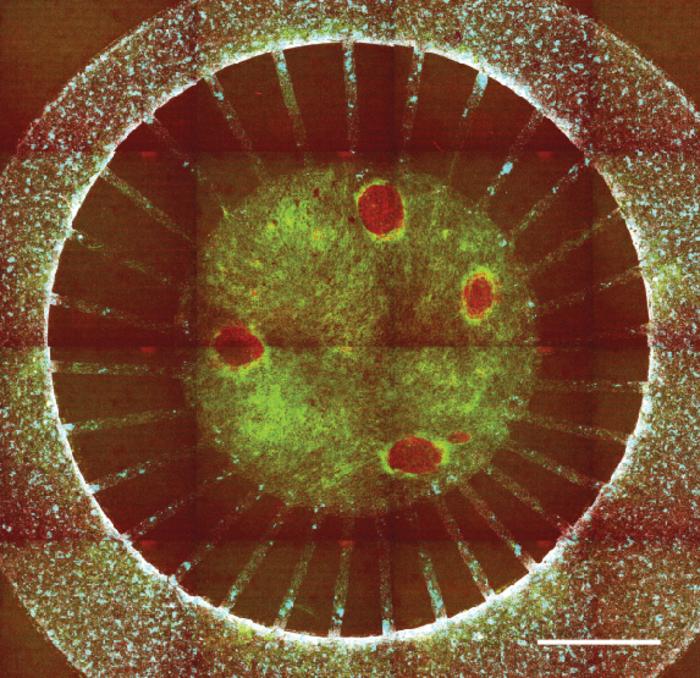A groundbreaking advancement in cancer therapy has emerged from the collaborative efforts of the Institute for Bioengineering of Catalonia (IBEC) and the Hospital del Mar Research Institute. This innovation, named MIRO (Micro Immune Response On-chip), is a sophisticated device designed to mimic cancerous tumors and their surrounding cellular environments using actual patient cells. This technological breakthrough could expedite the development of new cancer treatments tailored specifically for individual patients by providing accurate insights into how therapies interact with tumors and adjacent tissues.
Cancer therapy has long faced the challenge of efficacy, notably in the translation of promising laboratory results into successful human treatments. Regrettably, therapies that demonstrate effectiveness during in vitro studies or in animal models often fail to yield the same results in humans. MIRO addresses this gap by not only replicating tumor characteristics but also simulating the complex interactions between tumors and immune cells within their microenvironment. This capability is crucial for developing successful immunotherapy treatments, as the immune response plays a pivotal role in determining treatment outcomes.
Dr. Anna Labernadie, who was instrumental in developing the MIRO microfluidic system during her postdoctoral research at IBEC, emphasized that the device enables researchers to observe how tumors interact with immune cells, revealing crucial details that could enhance treatment efficacy. The ability to recreate both the tumor and its environment allows scientists to better understand the dynamics of these interactions. Immunotherapies, which harness the power of the immune system to combat cancer, currently exhibit varying success rates, benefiting only 20 to 40 percent of patients. By utilizing MIRO, researchers can explore strategies to improve these rates significantly.
Among the initial applications of MIRO, researchers investigated samples from patients with HER2-positive breast cancer. Her2 is a protein known to promote aggressive tumor growth, and therapies targeting this protein have been developed. Preliminary data indicate that the microenvironment surrounding breast tumors significantly protects them from effective treatments, such as the monoclonal antibody trastuzumab. This protection is critical because it signifies that the tumor microenvironment can impede the action of immune therapies, contributing to treatment resistance.
Dr. Alexandre Calon, who leads the Translational Research Laboratory in Tumor Microenvironment at the Hospital del Mar Research Institute, noted the striking observations made possible by MIRO’s advanced capabilities. The studies demonstrated that immune cells exhibit diminished motility as they approach the tumor, ultimately becoming blocked by a barrier formed by the tumor microenvironment. This insight could inform new approaches to enhance the effectiveness of cancer treatments by addressing the mechanisms that restrict immune cell function.
MIRO is not limited to breast cancer research. This innovative device has demonstrated its versatility through successful applications in other solid tumors, including lung and colon cancers. By employing cutting-edge microfluidic techniques, MIRO allows for the precise manipulation of fluids and cells on a microscale, facilitating detailed experimentation in a controlled setting. Different cell cultures can be compartmentalized, allowing researchers to observe the dynamic interactions between cancer cells, their connective stroma, and immune responses.
The significance of this research lies in its potential to revolutionize personalized cancer treatment. Unlike traditional methods that adopt a one-size-fits-all approach, MIRO enables direct testing of therapies that could be employed with specific patients in real-time. Dr. Xavier Trepat, an ICREA research professor at IBEC, highlighted the extraordinary ability of this model: it can help researchers determine which treatment strategies are most likely to succeed based on individual tumor-stroma interactions.
The implications of MIRO extend beyond the laboratory. By identifying biomarkers unique to individual patients and analyzing the emergence of resistance mechanisms, this tool is poised to play a vital role in tailoring immunotherapy treatments. Dr. Joan Albanell, head of the Medical Oncology Service at Hospital del Mar, asserted that MIRO represents an innovative preclinical model that could significantly improve the success and efficacy rates of novel immunotherapy strategies before they undergo clinical trials.
As researchers look to the future, they intend to transfer MIRO technology to pharmaceutical companies and hospitals to facilitate its application in clinical settings. This transition is crucial for translating scientific discoveries into tangible patient benefits. Dr. Labernadie noted that a joint patent application has already been filed for MIRO’s technology, underscoring the commitment of IBEC, ICREA, and the Hospital del Mar Research Institute to advancing cancer treatment through innovation.
The MIRO initiative is part of a broader effort to understand the intricate roles of immune ecosystems in cancer progression. As evidenced by Alice Preucca’s PhD thesis work at IBEC, research is not deterred by the complexities of cancer biology; rather, it embraces them, recognizing that the interplay among various cellular components shapes disease progression and treatment response.
Collaboration has been a cornerstone of this project, with contributions from the Institute for Research in Biomedicine (IRB Barcelona), the University of Barcelona (UB), and other esteemed institutions enhancing the robustness of findings. The initiative further receives backing from various funding bodies, including the “la Caixa” Foundation and the Spanish Ministry for Science and Innovation, highlighting the multifaceted support that scientific research relies upon.
While the clinical application of MIRO is still underway, its potential to reshape cancer therapy is undeniable. The ongoing exploration of tumor dynamics, immune interactions, and personalized treatments heralds a new era in oncology, where patient outcomes may see unprecedented improvement. As researchers continue to unravel the complexities of cancer, tools like MIRO promise to bridge the gap between laboratory science and real-world therapeutic application, offering hope for more effective and individualized cancer treatments in the future.
Subject of Research: Human tissue samples
Article Title: Micro Immune Response On-chip (MIRO) models the tumour-stroma interface for immunotherapy testing
News Publication Date: 3-Feb-2025
Web References: Nature Communications
References: N/A
Image Credits: Institute for Bioengineering of Catalonia (IBEC)
Keywords: Immunotherapy, Breast cancer, Colon cancer, Lung cancer, Stroma, Tumor microenvironments, Interleukins.
Tags: advanced cancer therapy developmentcancer treatment personalizationcollaboration in medical innovationimmune response evaluation in cancerimmunotherapy advancementsInstitute for Bioengineering of Cataloniamicrofluidic systems in oncologyMIRO cancer research technologypatient-derived cancer modelstranslational cancer research challengestumor microenvironment simulationtumor-replicating device





